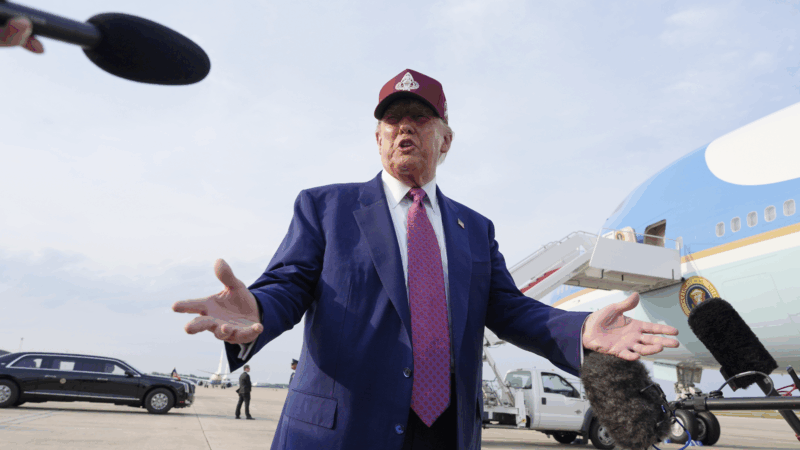Majorities in key U.S. allies have no confidence in Trump’s global leadership
More than half of people in key U.S. allies – including France, the United Kingdom, Germany, South Korea and Japan – have no confidence in President Trump’s leadership in world affairs, according to a new global survey by the Pew Research Center.
People in 15 of 24 countries downgraded their ratings of the U.S., according to the survey of more than 28,000. In addition, majorities in almost every country surveyed describe Trump as “arrogant” and “dangerous.”
NPR reached out to the White House for a response to the survey’s results.
“President Trump is the president of the American people and his priority is to work on their behalf, nobody else’s,” wrote spokesman Steven Cheung. “The overwhelming majority of Americans support his America First agenda. America is back on top after four years of failure under Joe Biden.”
In fact, recent polls show the president’s approval rating stands at about 43%.
Richard Wike, who runs the global attitudes team at Pew, says one reason that Trump and the U.S. are receiving low ratings overseas is many people around the world want a more engaged America.
“If you look at our surveys over the years, people in other countries often want to see the U.S. working collaboratively, engaging in efforts with other countries to address big global challenges,” says Wike. “When the U.S. is going its own way, it’s seen more negatively.”
For instance, Trump pulled the U.S. out of the Paris international climate accord for the second time after taking office in January. In the Pew survey, less than 20% of people in Canada, France, Germany, Australia and Spain expressed confidence in Trump’s handling of climate change.
Trump has also imposed a series of steep, on-again, off-again tariffs on allies, such as Canada, and rivals, such as China, wreaking havoc with financial markets. Less than a third of people in the Netherlands, Italy, Japan and Sweden expressed confidence in the president’s ability to manage global economic problems, the survey found.
The survey was conducted from Jan. 8 to April 26 in 24 countries across Europe, the Middle East, the Asia-Pacific, sub-Saharan Africa and Latin America.
Of course, foreigners don’t vote in American elections, but Wike says international political opinion of the U.S. still matters.
“I think it makes it easier for leaders to cooperate with the United States if the U.S. is relatively popular in their country,” Wike says. “It doesn’t mean that a leader is not going to cooperate with the United States if the U.S. is unpopular . . . but hey, look, politicians respond to incentives.”
Some people did find positive aspects to Trump’s style. For instance, majorities in 18 countries consider Trump a strong leader. Ratings of the U.S. have improved since last year in Israel, Nigeria and Turkey.
Trump also did well with populists in Europe, according to the survey. 88% of people who support Hungarian Prime Minister Viktor Orban’s ruling Fidesz Party also express confidence in Trump, as do 56% of supporters of Germany’s right-wing party, Alternative for Germany.
This is not the first time many people overseas have expressed concerns about Trump and his personality. Confidence in Trump’s ability to do the right thing in international affairs plunged during the early months of his first term, according to a Pew survey at the time. For instance, 86% of Germans had confidence in President Barack Obama towards the end of his term. But that fell to just 11% after Trump took office in 2017. Back then, a majority of those polled in 37 countries called Trump arrogant, intolerant and dangerous.
The FDA creates a quicker path for gene therapies
The Food and Drug Administration aims to evaluate treatments for rare diseases based on plausible evidence that they would work — without requiring a clinical trial first.
BAFTAs apologize after guest with Tourette syndrome uses racial slur during ceremony
A man with Tourette syndrome shouted a racial slur and other offensive remarks during the BAFTA awards ceremony Sunday. The BBC did not edit out his outbursts in its delayed broadcast.
‘Everything was in pieces:’ Lindsey Vonn describes grueling surgery on broken leg
In a recent video, the Olympic skier credits her surgeon with saving her leg from potential amputation.
A new lawsuit alleges DHS illegally tracked and intimidated observers
Observers watching federal immigration enforcement in Maine who were told by agents they were "domestic terrorists" and would be added to a "database" or "watchlist" are now part of a new federal class action lawsuit.
Kate Hudson on regret, rom-coms and finding a role that hits all the notes
Hudson always wanted to sing, but feared it would derail her acting career. Now she's up for an Oscar for her portrayal of a hairdresser who performs in a Neil Diamond tribute band in Song Sung Blue.
A powerful winter storm is roiling travel across the northeastern U.S.
Forecasters called travel conditions "extremely treacherous" and "nearly impossible" in areas hit hardest by the storm, and air and train traffic is at a standstill in many parts of the region.








